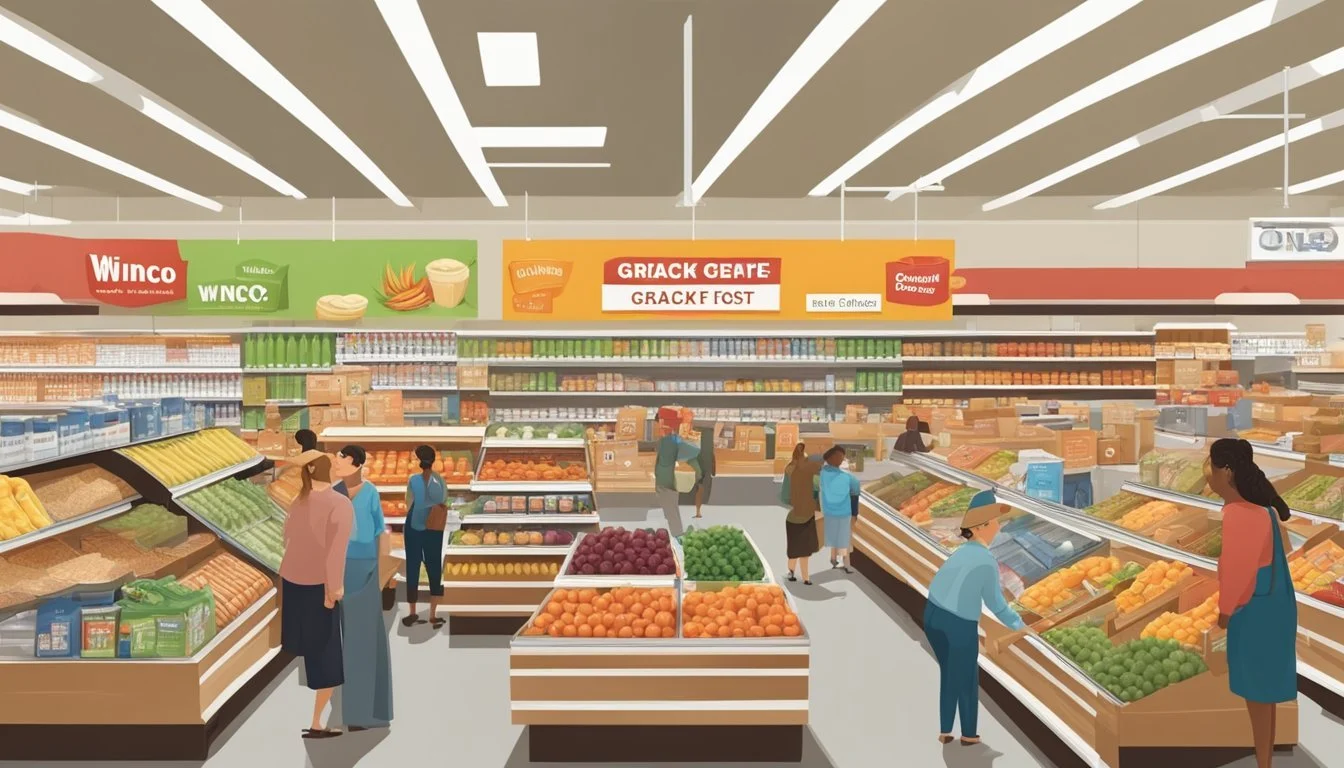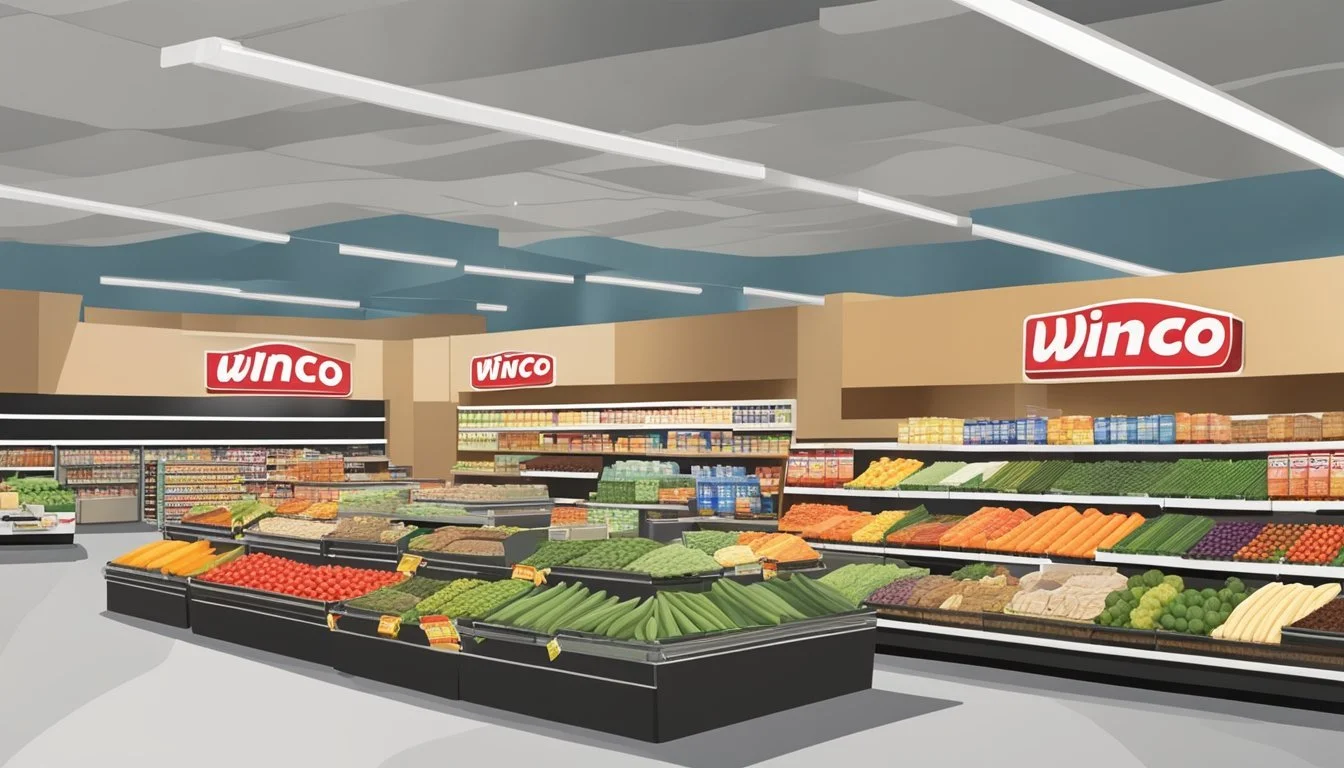WinCo Foods vs Winn-Dixie
A Comprehensive Comparison of Prices, Selection, and Service
WinCo Foods and Winn-Dixie are two popular grocery store chains in the United States, each with its own strengths and customer base. WinCo Foods operates primarily in the western and central regions, while Winn-Dixie serves customers in the southeastern states. Both stores aim to provide quality products at competitive prices.
When comparing these two grocery chains, several factors come into play, including pricing, product selection, store layout, and customer service. WinCo Foods generally offers lower prices on many items compared to other supermarkets, including Winn-Dixie, making it an attractive option for budget-conscious shoppers. This pricing advantage is largely due to WinCo's employee-owned business model and focus on cost-cutting measures.
Winn-Dixie, on the other hand, boasts a strong presence in the southern United States and has built a loyal customer following over its long history. The chain emphasizes fresh produce, quality meats, and a wide selection of regional products that cater to local tastes. While prices may be slightly higher than WinCo, Winn-Dixie often compensates with frequent promotions and a more diverse product range.
History and Overview of WinCo Foods
WinCo Foods began as a small discount grocery store in Boise, Idaho. It has since grown into a major employee-owned supermarket chain operating across the western United States.
Origin and Expansion
WinCo Foods started in 1967 as a no-frills warehouse-style store called Waremart. Founded by Ralph Ward and Bud Williams, the company focused on offering low prices to customers. The original Boise location emphasized a bare-bones shopping experience to keep costs down.
Over the decades, WinCo expanded steadily across the western states. It changed its name from Waremart to WinCo Foods in 1999. The new name stood for Winning Company.
Today, WinCo operates over 140 stores in 10 states: Idaho, Washington, Oregon, California, Nevada, Utah, Arizona, Texas, Oklahoma, and Montana. The company remains headquartered in Boise, Idaho.
WinCo is now majority employee-owned through an Employee Stock Ownership Plan. This structure allows workers to earn shares in the company over time.
Fundamentals of Winn-Dixie Stores
Winn-Dixie has established itself as a prominent grocery chain on the East Coast of the United States. The company's history spans several decades, marked by significant growth and expansion throughout the southeastern states.
Foundation and Growth
Winn-Dixie's roots trace back to 1925 when William Milton Davis purchased an Idaho grocery store. The company expanded rapidly, moving into the Southeast and adopting the Winn-Dixie name in 1955. Throughout the 1950s and 1960s, Winn-Dixie acquired numerous regional chains, solidifying its presence in states like Florida, Georgia, and Alabama.
By the 1980s, Winn-Dixie had become one of the largest supermarket chains in the United States. The company focused on providing a wide range of products, including fresh produce, meat, and private-label items. Winn-Dixie also introduced innovative concepts such as in-store pharmacies and fuel centers at select locations.
Despite facing financial challenges in the early 2000s, Winn-Dixie underwent restructuring and continued to serve communities across the Southeast. Today, the chain operates hundreds of stores, primarily in Florida, Alabama, Louisiana, Georgia, and Mississippi.
Store Brand Comparisons
WinCo Foods and Winn-Dixie both offer store brand products, but their strengths lie in different areas. WinCo excels in bulk and pantry items, while Winn-Dixie shines in its deli and bakery offerings.
WinCo's Bulk and Pantry Selection
WinCo Foods is renowned for its extensive bulk section. Customers can purchase a wide variety of pantry staples in customizable quantities, often at lower prices than pre-packaged alternatives.
The store's bulk bins feature items like nuts, grains, spices, and dried fruits. This approach allows shoppers to buy exactly what they need, reducing food waste and saving money.
WinCo's store brand products extend to pantry essentials. These items typically offer comparable quality to national brands at more affordable prices. Common store brand products include canned goods, baking supplies, and household items.
Winn-Dixie's Deli and Bakery Offerings
Winn-Dixie takes pride in its deli and bakery departments. The store's SE Grocers brand is prominent in these sections, offering a range of prepared foods and baked goods.
The deli features freshly sliced meats and cheeses, as well as ready-to-eat meals. Rotisserie chickens and made-to-order sandwiches are popular choices among customers.
In the bakery, Winn-Dixie produces a variety of breads, pastries, and cakes daily. The SE Grocers brand white sandwich bread is noted for its value, offering quality comparable to national brands at a 20% lower price point.
Winn-Dixie's store brand extends to other departments, providing alternatives to national brands across various product categories.
Product Quality and Variety
WinCo Foods and Winn-Dixie offer different product selections and quality levels. Their approaches to produce, meats, groceries, and brand availability shape the shopping experience for customers.
Produce and Meat Quality
WinCo Foods emphasizes fresh produce at competitive prices. Their produce sections often feature locally sourced fruits and vegetables when in season. The quality is generally good, with a focus on affordable options.
Winn-Dixie, on the other hand, tends to offer a wider variety of premium and organic produce choices. Their meat departments are known for higher-quality cuts and a broader selection of specialty meats.
Both stores maintain seafood counters, but Winn-Dixie typically provides a more extensive range of fresh fish and shellfish options.
Grocery Items and Brand Availability
WinCo Foods stands out for its bulk food section, offering grains, nuts, and dried goods at lower prices. The store carries a mix of national brands and private label products, with an emphasis on value.
Winn-Dixie stocks a larger selection of name-brand items across all categories. Their dairy section is particularly robust, featuring both mainstream and specialty products.
WinCo's selection of frozen foods is more limited but budget-friendly. Winn-Dixie offers a broader range of frozen meals and premium ice cream brands.
Both stores carry basic household items, but Winn-Dixie typically has a more diverse selection of non-food products.
Price Analysis and Value
WinCo Foods and Winn-Dixie offer different pricing strategies and value propositions for shoppers. A comparison of their everyday prices and discount programs reveals key differences that can impact customers' grocery budgets.
Everyday Pricing
WinCo Foods generally offers lower everyday prices compared to Winn-Dixie. WinCo's pricing model focuses on keeping costs down through efficient operations and a no-frills shopping experience.
The store emphasizes bulk buying options, which can lead to additional savings for customers willing to purchase larger quantities. WinCo's private label products are often priced significantly lower than national brands, providing budget-conscious shoppers with more affordable alternatives.
Winn-Dixie's everyday prices tend to be higher than WinCo's. However, Winn-Dixie often provides a wider selection of national brand products and specialty items, which may appeal to shoppers looking for specific brands or gourmet options.
Discounts and Coupons Usage
WinCo Foods does not accept manufacturer coupons, which may be a drawback for coupon-clipping shoppers. The store focuses on maintaining consistently low prices rather than offering temporary discounts.
WinCo does provide occasional in-store promotions and bulk purchase discounts. These can offer significant savings on select items, especially for customers buying in large quantities.
Winn-Dixie, on the other hand, has a more robust discount and coupon program. The store accepts manufacturer coupons and frequently offers digital coupons through its loyalty program.
Winn-Dixie's weekly ad specials and BOGO (Buy One Get One) deals can provide substantial savings for shoppers who plan their purchases around these promotions. The store's loyalty program also allows customers to earn points on purchases, which can be redeemed for discounts on future shopping trips.
Convenience and Shopper Experience
WinCo Foods and Winn-Dixie offer distinct shopping experiences. Their store layouts, cleanliness standards, and checkout processes impact customer convenience and satisfaction in different ways.
Store Layout and Cleanliness
WinCo Foods features a warehouse-style layout with wide aisles and bulk bins. This design allows for efficient restocking and easy navigation. Shoppers can quickly locate items in the clearly marked sections. The store's no-frills approach may result in a less polished appearance compared to traditional supermarkets.
Winn-Dixie opts for a more traditional grocery store layout. Departments are arranged in a familiar pattern, making it easy for regular shoppers to find their usual items. The stores generally maintain a clean and tidy appearance, with well-organized shelves and displays.
Both chains prioritize cleanliness, but their approaches differ. WinCo's focus on efficiency sometimes leads to a more utilitarian feel. Winn-Dixie aims for a more polished look, with attention to visual merchandising and store aesthetics.
Checkout Efficiency
WinCo Foods is known for its self-bagging policy. Customers bag their own groceries, which can speed up the checkout process for experienced shoppers. The stores often have multiple checkout lanes open to handle high customer volumes.
Winn-Dixie provides a more traditional checkout experience. Cashiers typically bag groceries for customers, which some shoppers prefer. The chain has invested in self-checkout options in many locations, offering flexibility for those who prefer a quicker exit.
Wait times can vary at both stores depending on location and time of day. WinCo's efficient model often results in shorter lines, even during peak hours. Winn-Dixie's customer service focus may lead to slightly longer wait times but offers a more personalized experience.
Comparative Analysis of Services
WinCo Foods and Winn-Dixie offer distinct service approaches tailored to their target customers. Both chains emphasize value but differ in their execution and additional offerings.
Customer Service Philosophies
WinCo Foods operates on a self-service model. Customers bag their own groceries and often navigate the store independently. This approach allows WinCo to keep prices low by reducing labor costs.
Winn-Dixie, in contrast, provides a more traditional grocery experience. They offer bagging services and typically have more staff available to assist customers throughout the store.
WinCo's bulk section is a standout feature, allowing shoppers to purchase precise quantities of dry goods. This service appeals to budget-conscious consumers and those looking to reduce packaging waste.
Additional Services Offered
Winn-Dixie's deli and bakery departments are more extensive than WinCo's. They often feature prepared meals, custom cakes, and a wider variety of freshly baked goods.
WinCo focuses on providing a large variety of products at low prices. Their stores typically stock over 5,000 items, including many private-label options.
Winn-Dixie offers pharmacy services in many locations, a feature not typically found in WinCo stores. They also provide online ordering and delivery options in select markets.
Both chains have loyalty programs, but Winn-Dixie's tends to be more robust, offering personalized deals and fuel perks at participating gas stations.
Consumer Savings Strategies
Shoppers can maximize their savings at WinCo Foods and Winn-Dixie through strategic approaches. These include taking advantage of loyalty programs and exploring bulk purchasing options.
Loyalty Programs Implementation
WinCo Foods does not offer a traditional loyalty program. Instead, they focus on keeping prices low for all customers. Winn-Dixie, however, provides the SE Grocers rewards program. This program allows shoppers to earn points on purchases, which can be redeemed for discounts on fuel or groceries.
Customers can sign up for the SE Grocers rewards program online or in-store. Points accumulate with each purchase and typically expire after a set period. Special promotions often offer bonus points on specific items.
Buying in Bulk and Membership Benefits
WinCo Foods excels in bulk purchasing options. Their extensive bulk foods section allows customers to buy exactly the amount they need, often at lower prices than pre-packaged alternatives. This approach helps reduce packaging waste and saves money.
WinCo does not require a membership fee to access their low prices or bulk options. All shoppers can take advantage of these savings. Winn-Dixie occasionally offers bulk purchase discounts on select items, particularly during sales events.
For both stores, buying in larger quantities can lead to significant savings. Non-perishable items and household goods are often more cost-effective when purchased in bulk. Shoppers should compare unit prices to ensure bulk purchases truly offer savings.
Comparing Other Retailers and Market Alternatives
WinCo Foods and Winn-Dixie face competition from various grocery chains and alternative markets. These competitors offer different pricing strategies, product selections, and shopping experiences.
WinCo and Winn-Dixie vs. Large Chains
Walmart stands out as a major competitor to both WinCo and Winn-Dixie. Walmart often offers lower prices on many items compared to WinCo and Winn-Dixie. For example, Walmart's prices on beverages, baking goods, canned goods, and dairy products tend to be cheaper than WinCo's.
Kroger and Publix are other significant players in the grocery market. Kroger emphasizes its private label products and fuel rewards program, while Publix is known for its customer service and fresh prepared foods.
Costco provides a bulk-buying option that can be cost-effective for some shoppers. However, WinCo's everyday low prices on individual items may be more appealing to those who don't need large quantities.
Alternative Grocery Stores and Markets
Aldi is a strong competitor in the discount grocery sector. Like WinCo, Aldi focuses on keeping costs low through efficient operations and a limited selection of mostly private label products.
Whole Foods Market and Sprouts Farmers Market cater to health-conscious consumers. These stores often have higher prices but offer a wide range of organic and specialty products.
Regional chains like H-E-B in Texas and Wegmans in the Northeast have loyal customer bases due to their local focus and unique product offerings.
Farmers markets and local food co-ops provide alternatives for shoppers seeking fresh, locally-sourced produce and specialty items. These options often support local economies but may have limited selections compared to larger grocery chains.
Sustainability and Ethical Practices
WinCo Foods and Winn-Dixie have both implemented sustainability initiatives and ethical practices in their operations. These efforts focus on environmental conservation and community engagement, reflecting growing consumer interest in responsible business practices.
Environmental Initiatives
WinCo Foods has invested in energy-efficient lighting and refrigeration systems across its stores. The company uses LED bulbs and motion sensors to reduce electricity consumption. WinCo also operates a robust recycling program, diverting cardboard, plastic, and organic waste from landfills.
Winn-Dixie has made strides in reducing its environmental footprint. The supermarket chain has implemented a comprehensive recycling program and works to minimize food waste. Winn-Dixie has also invested in more energy-efficient equipment and practices in its stores and distribution centers.
Both retailers have taken steps to reduce plastic bag usage. WinCo encourages customers to bring reusable bags, while Winn-Dixie offers recyclable paper bags as an alternative to plastic.
Local Sourcing and Community Involvement
WinCo Foods prioritizes local sourcing when possible, partnering with regional farmers and producers. This approach supports local economies and reduces transportation-related emissions. The company also donates to food banks and community organizations in areas where it operates.
Winn-Dixie emphasizes community involvement through its parent company, Southeastern Grocers. The supermarket chain supports local charities and disaster relief efforts. Winn-Dixie also promotes locally sourced products, showcasing them in dedicated store sections.
Both retailers offer employee volunteer programs, encouraging staff to engage in community service activities. These initiatives help strengthen ties with local communities and boost the companies' reputations as socially responsible businesses.
Final Verdict and Recommendations
WinCo Foods and Winn-Dixie each offer unique advantages for grocery shoppers. The best choice depends on individual priorities like price, product selection, and location.
Best Options Based on Consumer Needs
Budget-conscious shoppers in Western states should consider WinCo Foods. Its bulk bin section and lower prices on staples like ground beef and hot dogs make it ideal for stocking up. WinCo's employee-owned structure often translates to better customer service.
Winn-Dixie shines in the Southeast, particularly in Florida and neighboring states. It appeals to shoppers seeking a balance of affordability and variety. Winn-Dixie's loyalty program and weekly specials can yield significant savings for regular customers.
For organic and specialty items, neither store excels. Shoppers prioritizing these products may need to look elsewhere.
Overall Shopping Experience
WinCo Foods offers a no-frills environment focused on value. Customers bag their own groceries and must bring cash or debit cards. The store layout is straightforward, emphasizing efficiency over ambiance.
Winn-Dixie provides a more traditional supermarket experience. Its stores typically feature full-service delis, bakeries, and pharmacies. The chain has invested in store renovations to create a more modern, welcoming atmosphere.
Both stores maintain clean facilities and stock fresh produce. However, WinCo's limited locations may inconvenience some shoppers, while Winn-Dixie's slightly higher prices could deter the most cost-conscious consumers.










